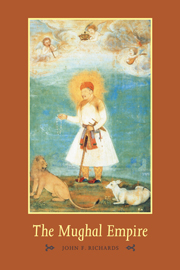Book contents
- Frontmatter
- Contents
- List of maps and tables
- General editor's preface
- Preface
- Introduction
- 1 Conquest and stability
- 2 The new empire
- 3 Autocratic centralism
- 4 Land revenue and rural society
- 5 Jahangir 1605–1627
- 6 Shah Jahan 1628–1658
- 7 The War of Succession
- 8 Imperial expansion under Aurangzeb 1658–1689
- 9 The economy, societal change, and international trade
- 10 Maratha insurgency and Mughal conquest in the Deccan
- 11 The Deccan Wars
- 12 Imperial decline and collapse, 1707–1720
- Conclusion
- Glossary
- Bibliographic essay
- Index
- THE NEW CAMBRIDGE HISTORY OF INDIA
Conclusion
Published online by Cambridge University Press: 28 March 2012
- Frontmatter
- Contents
- List of maps and tables
- General editor's preface
- Preface
- Introduction
- 1 Conquest and stability
- 2 The new empire
- 3 Autocratic centralism
- 4 Land revenue and rural society
- 5 Jahangir 1605–1627
- 6 Shah Jahan 1628–1658
- 7 The War of Succession
- 8 Imperial expansion under Aurangzeb 1658–1689
- 9 The economy, societal change, and international trade
- 10 Maratha insurgency and Mughal conquest in the Deccan
- 11 The Deccan Wars
- 12 Imperial decline and collapse, 1707–1720
- Conclusion
- Glossary
- Bibliographic essay
- Index
- THE NEW CAMBRIDGE HISTORY OF INDIA
Summary
During his half-century-long reign from 1556 to 1605, Akbar's repeated victories enabled him to build a multi-regional empire from the territories of defeated kingdoms. He and his advisers devised innovative and durable centralized institutions. But dynamic expansion did not end with Akbar's death. Instead, the Mughal empire continued to expand and to deepen its administrative control from 1556 until 1689.
Imperial dynamism was at its core military. The Mughal empire was a war-state. The dynasty and nobles were warriors governed by an aggressively martial ethos. By far the greater proportion of the state's resources was devoted to war and preparation for war. Every year Mughal troops were engaged in active campaigning against foreign enemies or domestic rebels. The Mughal emperors made little apology for attacks on neighboring states and needed still less by way of provocation. In common with all imperial rulers, they regarded adjoining states as either tributaries or enemies – no other category was possible.
To the north it was only when Mughal arms reached the extremities of the Indian subcontinent that the limits of expansion were established. Beyond the subcontinent the physical and social landscape together presented overwhelming obstacles. In the mountainous zones of the north Mughal armies found themselves precariously extended on their supply lines. They had difficulties foraging for firewood and fodder for their animals and could not rely upon the Indian grain merchants who supplied their needs when campaigning in the subcontinent.
- Type
- Chapter
- Information
- The Mughal Empire , pp. 282 - 297Publisher: Cambridge University PressPrint publication year: 1993



